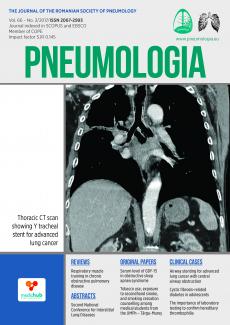Information group – a solution to increase the efficacity of specialized intervention for smoking ce
Abstract
Magdalena Ciobanu1, Catalina Panaitescu2, Aura Popescu3, Agripina Rascu4, Marinela Raileanu1, Miruna Todor1, Ana Maria Trailescu5, Bogdana Bursuc1, Catalina Constantin1, Florentina Lica1Information group – a solution to increase the efficacity of specialized intervention for smoking cessation Magdalena Ciobanu1, Catalina Panaitescu2, Aura Popescu3, Agripina Rascu4, Marinela Raileanu1, Miruna Todor1, Ana Maria Trailescu5, Bogdana Bursuc1, Catalina Constantin1, Florentina Lica1
1Institutul de Pneumologie „Marius Nasta" Bucuresti
2Policlinica „Sf. Mina" Bucuresti
3Institutul de Cardiologie „C.C. Iliescu" Bucuresti
4Spitalul Colentina Bucuresti, sectia Boli Profesionale
5Spitalul „Victor Babes" Bucuresti
Contact: Magda Ciobanu, magda_ciobanu@yahoo.com,
ABSTRACT
Since 2007, in Romania, the Ministry of Health implements the national programme for tobacco control which contains also a sub-programme for sustaining smoking cessation through free treatment and counselling. Because the specialised intervention lasts too long (often more than 60 minutes) and the requests for support increased with a high
rate, we had to identify methods to increase the efficacity of the intervention and, thus, the efficiency. According to this new situation, since January 2008, all the smokers asking for support to the Center for Smoking Cessation from the National Institute of Pneumology „Marius Nasta" had to participate to an „information group" prior to visit to the doctor or/ and psychologist for specialized help. The aim of this group is to offer the common information needed by all smokers and does not have any elements of group therapy. During 1st january 2008 - 31st December 2009, 829 smokers asked for help in Bucharest centers, from which 585 addressed to the physicians and 288 to the psychologists, a percentage being referred to both specialists. The smokers who are going directly to the specialist tend to choose only one specialist (67,8% doctor and 24% psychologist); only 8,1% are going to both specialists. In the meantime, those smokers who are participating to the information group, are using the servicies of both counsellors: 30,8% comparing with 28,2% only to doctor and 9,4% only to psychologist.
Comparing with the smokers who went directly to the doctor, the smokers who underwent the group of information had an increased succes rate at 3 months after quiting with 27,8%. Also, the percentage of „lost" persons decreased with 51%. Participation to the information group increases the likelihood of attendance to both specialists by 2,8 times. The common approach of the smoker increased the abstinence rate independently of the participation to the information group: 44% increase for smokers who participated to the information group, and 67,3% for persons that directly addressed to the physician.
In conclusion, organising an information group will increase the double approach of the smoker (by physician and psychologist) which, in turn, will increase the success rate and the efficiency of the medical act.
Key words: „Stop smoking" Programme, information group, smoking cessation counceling




 Information group - a solution to increase the efficacity of specialised intervention for smoking cessation
Information group - a solution to increase the efficacity of specialised intervention for smoking cessation